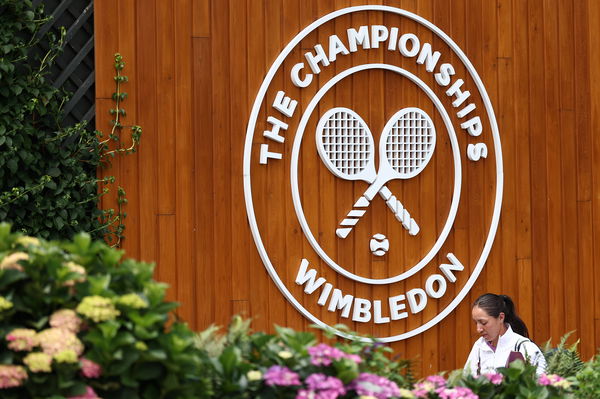
Imago
Wimbledon – 2nd Round Taylor Fritz USA during his second round match at the 2025 Wimbledon Championships at the AELTC in London, GREAT BRITAIN, on July 2, 2025. Photo by Corinne Dubreuil/ABACAPRESS.COM London United Kingdom PUBLICATIONxNOTxINxFRAxUK Copyright: xDubreuilxCorinne/ABACAx

Imago
Wimbledon – 2nd Round Taylor Fritz USA during his second round match at the 2025 Wimbledon Championships at the AELTC in London, GREAT BRITAIN, on July 2, 2025. Photo by Corinne Dubreuil/ABACAPRESS.COM London United Kingdom PUBLICATIONxNOTxINxFRAxUK Copyright: xDubreuilxCorinne/ABACAx
Wimbledon, the most tradition-steeped of the Grand Slams, stunned purists this year by replacing its 300 sharp-eyed line judges with HawkEye-powered Electronic Line Calling (ELC). But tech hasn’t come without turbulence. Over 450 cameras across 18 courts now call the lines, yet trust in the system is eroding. Emma Raducanu slammed “dodgy” ELC calls in her defeat to Aryna Sabalenka, while Swiss star Belinda Bencic, usually a tech fan, claimed the system “is not correct” at this event. Most recently, chaos erupted during Taylor Fritz’s match, sparking fresh outrage. In a twist, Wimbledon officials blamed a malfunction on a ball boy, adding fuel to the ELC controversy.
Watch What’s Trending Now!
The incident happened when Fritz was up 15-0 at the start of the fourth set when chaos unfolded. Chair umpire Louise Azemar-Engzell engaged in a prolonged exchange with officials before informing a stunned crowd that the electronic line-calling system had suffered a malfunction. Both Fritz and Khachanov appeared bewildered, visibly confused by yet another tech hiccup at this year’s Wimbledon.
With momentum shifting, Fritz had taken the first two sets, but Khachanov had stormed back in the third, and the timing of the disruption added tension. Azemar-Engzell finally addressed Court One: “Ladies and gentlemen, we will replay the last point because of a malfunction. The system is now working.” Though Fritz eventually sealed the win, the incident drew sharp focus on the reliability of technology. In response, tournament organizers issued a strong and direct statement, aiming to restore confidence in the integrity of officiating at SW19.
“The player’s service motion began while the BBG [Ball Boys and Girls] external was still crossing the net and therefore the system didn’t recognize the start of the point,” read the official statement of the All England Club issued recently. “As such, the Chair Umpire instructed the point be replayed.” A mishap, yes, but far from the end of the debate.
Wimbledon later clarified that this malfunction occurred because the system is calibrated to detect the player’s service motion only once the court is clear. Since the ball boy was still crossing during Fritz’s serve, Hawk-Eye failed to register the beginning of the point, confusing the sequence and triggering the incorrect call. Club officials also emphasized this wasn’t a failure of the technology itself, but a procedural lapse—one of several revealed during the 2025 edition.
In the aftermath, players didn’t hold back either. Karen Khachanov voiced his discomfort with the shift away from tradition. “I’m more for line umpires, to be honest,” he said. “You feel a little bit the court is too big, too alone without line umpires. At the same time, looks like AI and electronic line calls has to be very precise and no mistakes, but we’ve seen a couple. That’s questionable why this is happening.”

Imago
30th June 2024 All England Lawn Tennis and Croquet Club, London, England Wimbledon Tennis Tournament, Practice Day Jessica Pegula USA walks past the Wimbledon logo PUBLICATIONxNOTxINxUK ActionPlus12662083 ShaunxBrooks
On the other side of the net, philosophically, stood Taylor Fritz, who remained firmly in support of the new system. “There’s going to be some issues here and there,” he admitted. “I still think it’s much better to just have the electronic line calling, as opposed to the umpires, because I do like not having to think about challenging calls in the middle of points. The ball gets called, and we know, and that’s it.”
Backing the shift was Debbie Jevans, Chair of the All England Club, who reinforced the decision to modernize. “It’s funny, isn’t it,” she said to BBC Sport in a recent conversation. “when we did have linesmen, we were constantly asked why we didn’t have electronic line calling because it’s more accurate than they do the rest of the tour. The players wanted it because they were asking us, why do we have linesmen? Because of potential human error. And now we have it in situ. We have to think of innovation and we’re just moving with what the court and, mostly, what the players expect.”
But if this hiccup felt like the climax of drama, think again. Wimbledon’s tech tale might just be getting started.
Wimbledon apologizes to Pavlyuchenkova after the controversial line call
Remember the tense clash between Anastasia Pavlyuchenkova and Sonay Kartal in R16? The match took a controversial turn that’s now fueling heated debate across the tennis world. With the game level at 4-all in the first set and Pavlyuchenkova serving at deuce, Kartal hit a ball that visibly landed beyond the baseline.
Yet, there was no “out” call from the Electronic Line Calling (ELC) system. Chair Umpire Nico Helwerth stepped in, paused the match, and called up the ELC team. What came next shocked everyone: he ordered the point to be replayed instead of awarding it to the Russian.
Moments later, Kartal broke serve, and an emotional Pavlyuchenkova was seen in tears, pleading with the umpire that the game had been “stolen” from her. The controversial decision seemed to shift momentum in the match, leaving fans and pundits stunned. In the aftermath, the All England Club issued a statement confirming that both players had received formal apologies after officials determined the ELC system had malfunctioned.
In a more detailed explanation, the Club said that during court preparation, operators had inadvertently “unticked” the camera feeds on one side of Centre Court, deactivating the ELC for 6 minutes and 49 seconds. This resulted in three unregistered calls before the umpire intervened. As a corrective measure, Wimbledon has now removed the ability for on-site operators to manually deactivate the system during active play. Once a match begins, the ELC is locked and can no longer be toggled off—a move aimed at preserving consistency and integrity.
“We have had the opportunity to undertake further investigation, including speaking to the players, Chair Umpire, Hawk-Eye operators, and Review Official,” said a spokesperson. “It is now clear that the live ELC system, which was working optimally, was deactivated in error on part of the server’s side of the court for one game by those operating the system.”
The statement closed with an admission: “In this instance there was a human error and as a consequence we have fully reviewed our processes and made the appropriate changes.” Still, the damage was done, and the incident opened a larger discussion about whether the push toward full automation is compromising the integrity of the sport.
Tim Henman, former British No.1 and a current All England Club board member, also weighed in, noting these were not systemic technological failures but human errors in operating protocol. “The technology is sound, but we’ve seen that the infrastructure around it still needs tightening. It’s about managing the system more carefully—not abandoning it,” he said.
ATP ace Nick Kyrgios didn’t mince words when asked about it on talkSPORT’s Wimbledon Unfiltered. “Look, it’s not good enough, in my opinion, to be honest,” said the Aussie firebrand. “It’s the greatest tournament that we have in the world, and this is exactly why I thought that Wimbledon shouldn’t be trying to incorporate the electronic line calls—I feel like they almost rushed it this year.”
While most players still stand behind the precision of the electronic system over human calls, moments like these are forcing Wimbledon and fans to ask hard questions. The tournament may have moved toward innovation, but incidents like these suggest the future might need a few more tweaks before it’s ready to replace tradition entirely.

